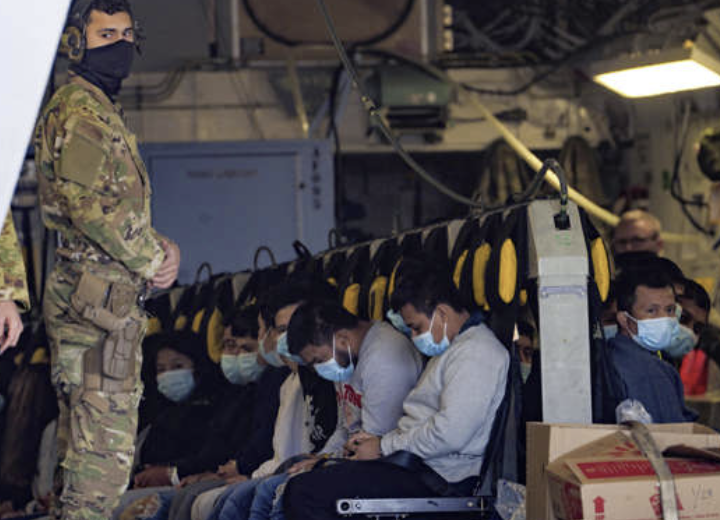
The Trump administration has announced plans to revoke by the end of April an immigration status that has allowed hundreds of thousands of migrants from Cuba, Haiti, Nicaragua, and Venezuela to work legally in the United States. The decision marks a significant shift in U.S. immigration policy, particularly affecting individuals who were granted entry due to ongoing economic, security, political, and health crises in their home countries.
The program, which was implemented under the Biden administration, provided temporary protection to approximately 532,000 immigrants between 2022 and 2023, according to government data. It was designed as a humanitarian measure, allowing migrants from these four countries to live and work legally in the U.S. without facing the immediate threat of deportation.
However, under the new policy, work permits and deportation protections for these individuals will be terminated. Secretary of Homeland Security Kristi Noem has stated that affected migrants should prepare to leave voluntarily or risk being forcibly removed by government authorities. The revocation of their protected status will officially take effect 30 days after the announcement is published in the Federal Register, expected on Tuesday.
Backlash from Advocacy Groups
The decision has sparked outrage among immigrant rights organizations and advocacy groups. Guerline Jozef, executive director of the Haitian Bridge Alliance, condemned the move, calling it an attack on vulnerable communities.
“This is a direct assault on poor Black and Brown people who dared to seek safety and a better life,” Jozef said in a statement. “These families have followed the legal process, abided by the rules, and built lives here. Now, they are being told they are no longer welcome—all because Trump wants to stoke fear and rally his base with racist rhetoric.”
Other advocacy groups have echoed similar concerns, warning that the policy change will lead to devastating consequences for thousands of families who have integrated into American society, contributing to the economy and workforce. Many of these migrants have established homes, enrolled their children in schools, and become part of local communities. The abrupt cancellation of their status leaves them in legal limbo, with few viable options for remaining in the U.S.
Part of Trump’s Broader Immigration Crackdown
The termination of the program is part of a broader effort by President Donald Trump to implement stricter immigration policies. Since returning to office, he has taken aggressive steps to curb both legal and illegal immigration. In addition to revoking protections for Cubans, Haitians, Nicaraguans, and Venezuelans, Trump has also announced plans for mass deportations targeting individuals who entered the U.S. without legal authorization.
A key focus of his immigration crackdown includes the removal of members of the Venezuelan criminal organization Tren de Aragua, which Trump has officially designated as a foreign terrorist organization. The group, known for its violent activities across Latin America and beyond, has been a growing concern for U.S. law enforcement agencies.
On his first day in office, Trump signed an executive order aimed at tightening border security, which included dismantling the CHNV immigration program. His administration argues that the policy, originally intended to ease pressure at the southern border, has instead created new enforcement challenges within the U.S. interior.
Government’s Justification for Ending the Program
In a statement prepared for publication in the Federal Register, DHS Secretary Kristi Noem defended the decision, arguing that the program had failed to achieve its intended goals.
“After a thorough review, DHS has determined that this so-called ‘deterrent’ and ‘incentive’ approach has not resulted in a meaningful or lasting improvement in border security,” Noem stated. “Instead, it has exacerbated challenges related to the enforcement of immigration laws within the country.”
She further argued that the program had simply replaced an influx of illegal border crossings with a different problem—an increase in the number of migrants residing in the U.S. without a clear path to permanent legal status.
“The CHNV parole programs have, at best, swapped an unmanageable surge of unlawful migration at the border for the additional challenge of managing a substantial population of foreign nationals within the United States,” Noem added.
What Comes Next?
With the program’s termination set to take effect in just a few weeks, thousands of affected migrants now face an uncertain future. Some may seek alternative legal pathways to remain in the U.S., such as asylum or sponsorship through family members, but these processes are often lengthy and complex. Others may be forced to leave, returning to countries still grappling with economic instability, political turmoil, and humanitarian crises.
In the coming weeks, immigrant advocacy organizations are expected to challenge the decision in court, arguing that the administration’s actions violate humanitarian protections and established immigration policies. Meanwhile, affected communities are bracing for the fallout, as many individuals who have built lives in the U.S. over the past few years now find themselves at risk of deportation.
As the debate over immigration intensifies, the Biden administration and Democratic lawmakers are likely to push back against Trump’s policies, framing them as inhumane and counterproductive. However, with Trump’s renewed focus on strict immigration enforcement, his administration appears committed to rolling back protections and implementing a hardline stance on migration.


